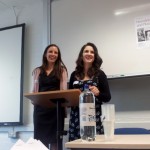On 4th October 2013 the Department of Classics at Reading, hosted a one-day workshop on the subject of Herodotos and Plutarch. The workshop was organised by two of the Department’s doctoral students, Lucy Fletcher and Niki Karapanagioti, with the support of Professors Timothy Duff and Phiroze Vasunia.
We were delighted to welcome as participants: Christopher Pelling (Oxford), Judith Mossman (Nottingham), Timothy Duff (Reading), Michele Lucchesi (Oxford), Tim Whitmarsh (Oxford), Tom Harrison (Liverpool), Aristoula Georgiadou (Patras), Suzanne Saïd (Paris/Columbia), John Marincola (Florida), Carolyn Dewald (Bard College), Rosaria Munson (Swarthmore College), Tim Rood (Oxford) and Phiroze Vasunia (Reading). The papers and responses aimed to explore in-depth the relationship between these important Greek authors. Subjects ranged from the representation of individual Greek states in the writings of Plutarch and Herodotos, through Plutarchan re-working of Herodotean material, Plutarch’s peculiarly ethical Herodotos, Plutarch as reader of Herodotos and more broadly the readership of the Histories, and on to more individual instances of Plutarch’s engagement with Herodotos in specific works and for specific historical events and themes.
The organisers were delighted with the response they received from interested parties prior to the event, and were pleased to welcome to Reading approximately fifty delegates, including a number of current Reading students – both undergraduate and postgraduate – and staff. The response on the day from all participants was equally pleasing. The papers sparked enthusiastic responses and extensive discussion, as manifest in the way in which we quickly departed from the timings advertised on the programme!
The workshop was immensely successful in generating debate and opening new lines of enquiry into this subject as a fruitful area of study. Existing scholarship had focused on Plutarch’s reception of Herodotos in his polemical treatise, De Herodoti Malignitate, and on specific instances where the Histories function as a source within Plutarchan texts. The conference proved particularly revealing, however, of the much greater potential inherent in this relationship as a subject of study for both Plutarchan and Herodotean scholars. It made apparent the value of a retrospective turn to Herodotos from Plutarch for illuminating the text of the earlier writer, and the wider value of looking proleptically at Plutarch from Herodotos.
The organisers were extremely pleased with the event, and were delighted to receive so many messages from delegates to express how much they had enjoyed the day, and how much they felt it had achieved. It is a pleasure to take one final opportunity to thank all the participants for making the day so successful and rewarding. We would also like to thank the Department of Classics at Reading (and especially Prof. Peter Kruschwitz, former Head of Department), the Jowett Copyright Trust, the Institute of Classical Studies, the Society for the Promotion of Hellenic Studies, and the Graduate School at Reading for their support. Lastly, we are delighted to thank Professors Timothy Duff and Phiroze Vasunia once again for their kindness and generosity in offering so much invaluable help and advice.












